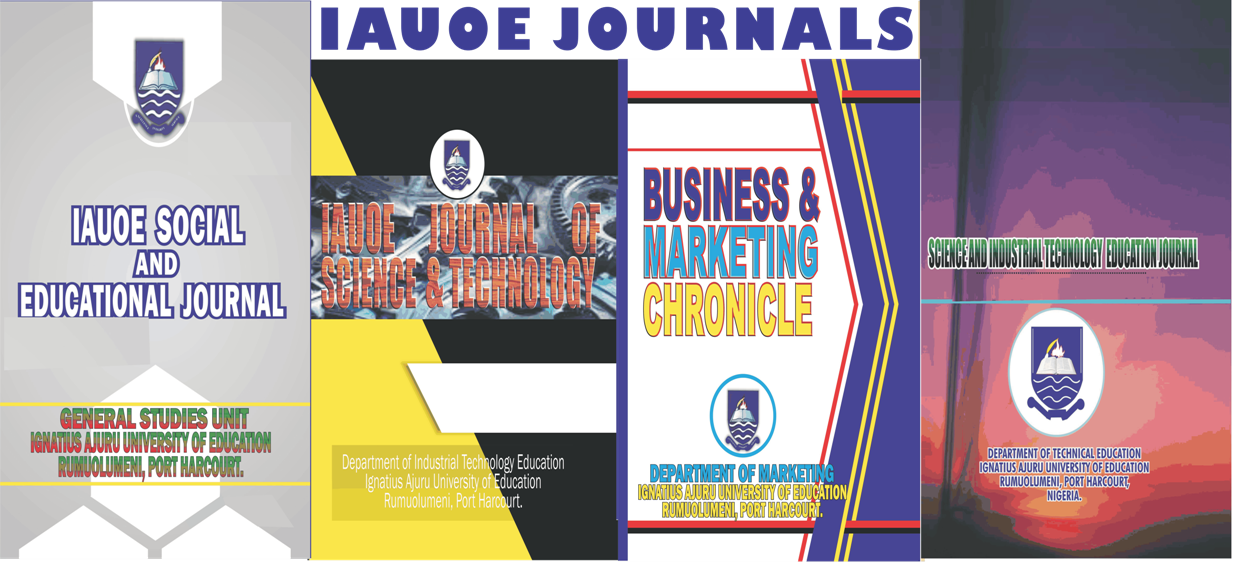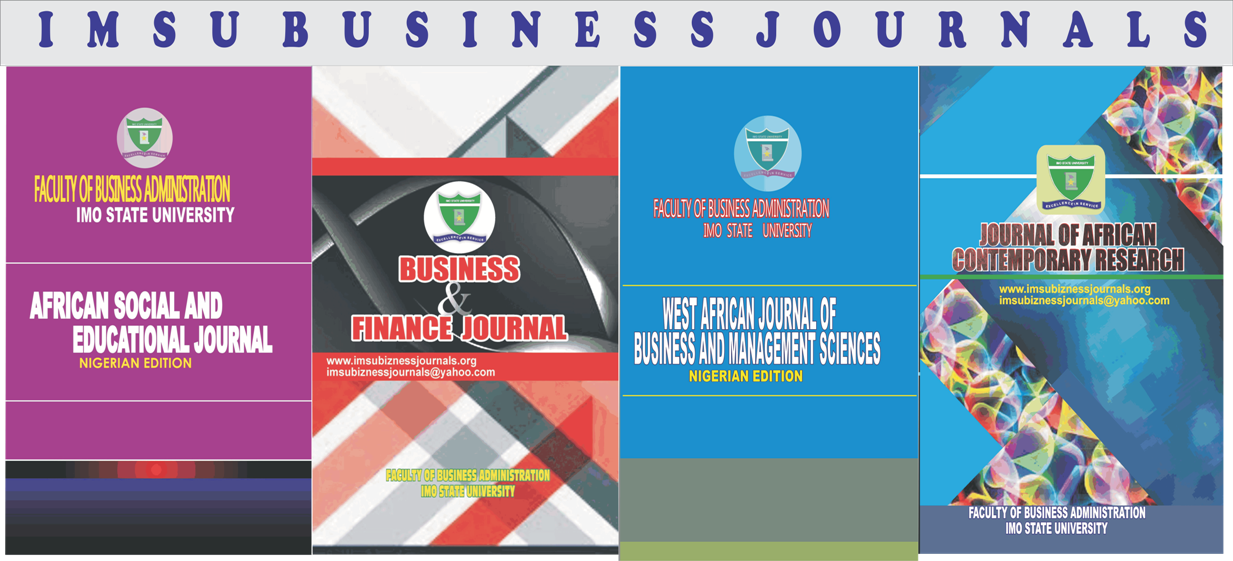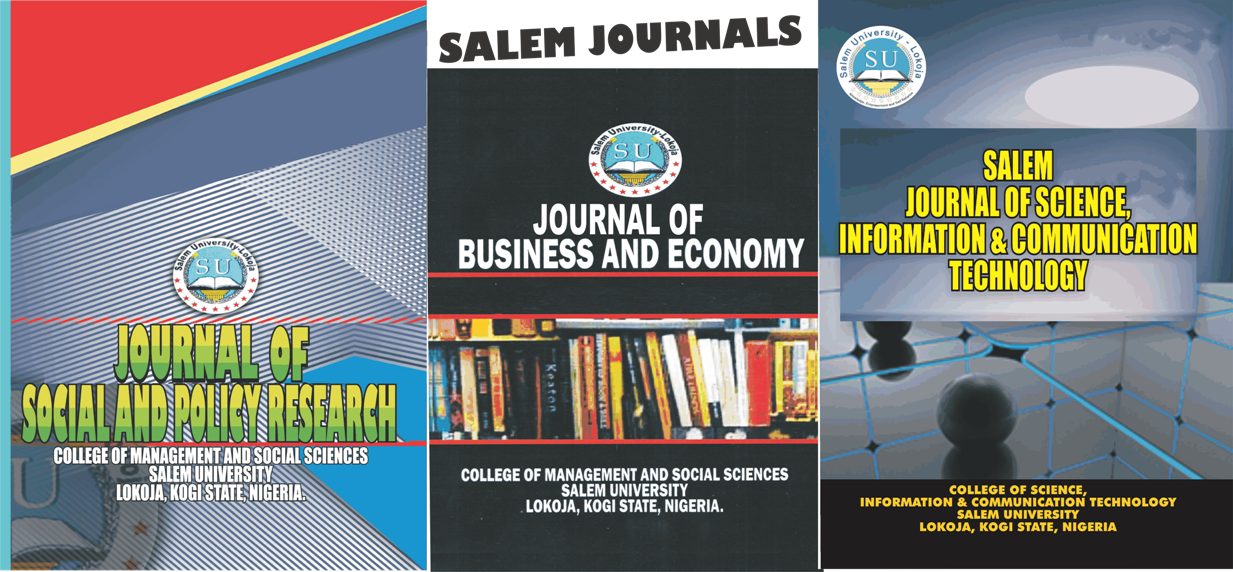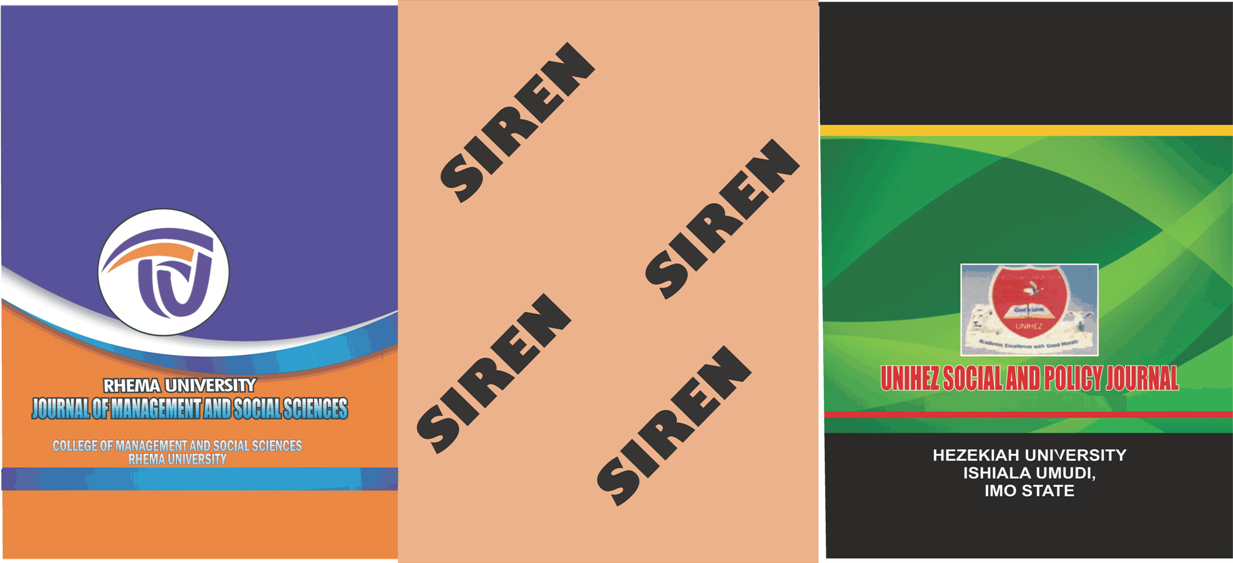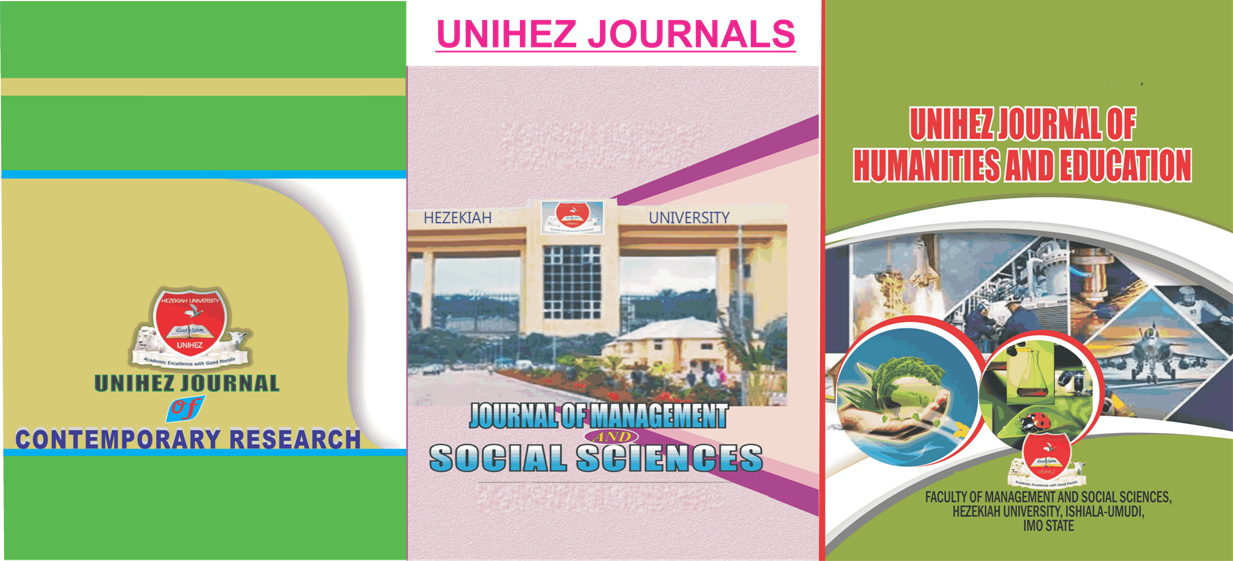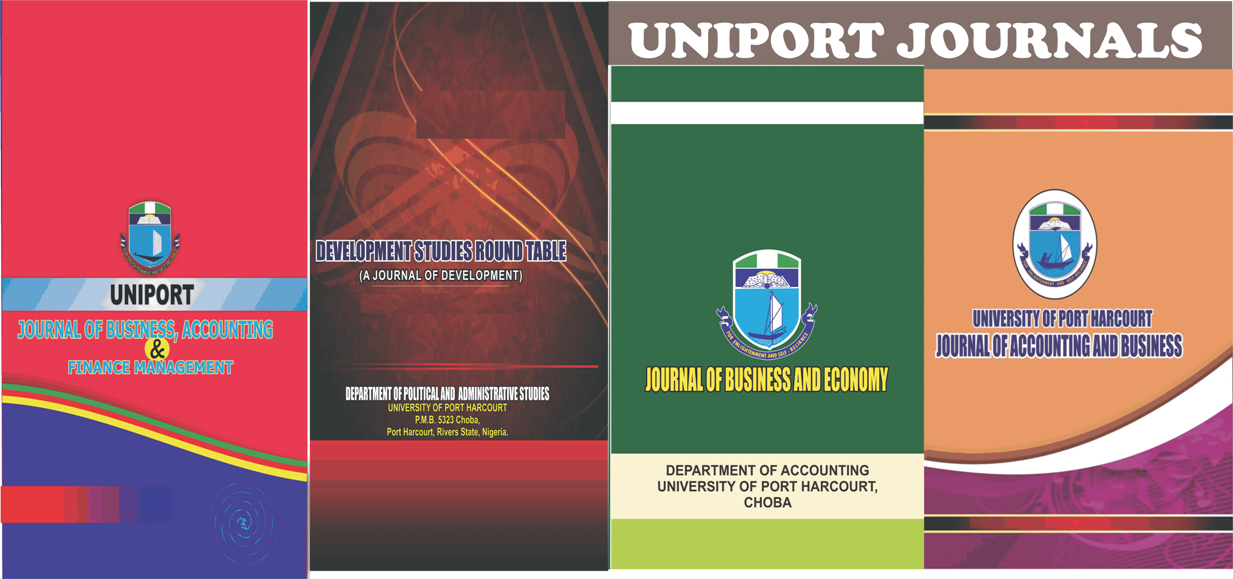2023 Archive
| 1 |
Title: DIVIDENED POLICY AND PERFORMANCE OF DEPOSIT MONEY BANKS IN NIGERIA.pdf Author: Ekwelem C. L., Nnodim, E. O. & Onuoha, C. J. Abstract: Undoubtedly every firm has a desire to earn high net income and ultimately increase its earnings per share (EPS) but there are some factors that affect its income which invariably affect what they give back to their shareholders (Dividend). Dividend refers to a payment made by a corporation to its shareholders usually as a distribution of profits. According to Abdul and Mohammed (2017), dividend refers to the amount of money that a firm pays out to its shareholders from the profits. View |
| 2 |
Title: GOVERNMENT CAPITAL EXPENDITURE AND ECONOMIC PERFORMANCE OF NIGERIA.pdf Author: Prof. Ndubuisi J. Ihe, & Nnabuife Shadrach Sunday Abstract: This study investigated the effect of government capital expenditure and economic performance of Nigeria 1990 to 2020. The study employed secondary source of data collection. Data collected were analyzed through the use of vector error correction model. The findings revealed that government capital expenditure on economic services have positive effect on economic performance, community service and transfer have negative significant effect on economic performance respectively, while government capital expenditure on administration has negative insignificant effect on economic performance. The study concluded via the result of the joint effect of the predictors that government capital expenditure has significant impact on the performance of Nigeria economy. The study therefore recommended that government should channel more funds to community services and administration in order to increase the welfare of the citizen. View |
| 3 |
Title: CORPORATE TAX AND PERFORMANCE OF LISTED OIL AND GAS COMPANIES IN NIGERIA (2012-2021).pdf Author: Duru Oluchi & Nnodim Eniwogho Ologhene Abstract: This study examined effect of corporate tax on performance of listed oil and gas companies in Nigeria. Secondary data were sourced from Conoil, Oando, Ukoromi and Sons Limited and Empire Energy Group Limited. Corporate tax was proxied by company income tax, education tax and petroleum profit tax as the independent variable while performance was proxied by return on equity and return on asset as dependent variable. Data were analysed using ordinary least square (OLS) using SPSS statistical package. Findings show that company income tax had negative and insignificant effect of on ROA and ROE of oil and gas companies in Nigeria. Education tax (EDT) had negative and insignificant effect on ROA of oil and gas companies in Nigeria. Education tax (EDT) had positive and insignificant effect on ROE of oil and gas companies in Nigeria. Petroleum profit tax (PPT) had positive and insignificant effect on ROA and ROE of oil and gas companies in Nigeria. The researcher, therefore, concluded that corporate tax had a positive and insignificant relationship with performance of oil and gas companies in Nigeria. The study, therefore, recommended among others that Government should consider revising its corporate tax policy to provide greater incentives for investment in the oil and gas industry by reducing the overall tax burden for companies that demonstrate strong financial performance and contribute to the development of the industry. View |
| 4 |
Title: GOVERNMENT BORROWING AND ECONOMIC DEVELOPMENT IN NIGERIA (2000-2021).pdf Author: Prof. Ngozi I., Assoc. Prof. L.C. Chukwu & Chima, Ambrose N. PhD. Abstract: This research examined the relationship between federal government borrowing and Economic Development in Nigeria from 2000-2001. The government of Nigeria has been implementing various fiscal measures (government borrowing) to ensure economic resilience, and this study seeks to examine their effectiveness. The quasi-experimental design and ex-post facto data were adopted for the study. Data for the research analysis were sourced from reliable institutions such as the Central Bank of Nigeria (CBN) Bulletin, Federal Bureau of Statistics (FBS) and Debt Management Office (DOM). Four Null-hypotheses were formulated, tested and result interpreted. The study also employed regression analysis. Findings of the study revealed that external debt financing infrastructures, security, government expenditure and financing entrepreneurships and other private credits towards boosting the economic development in Nigeria has not really yielded a positive outcome over the years. The study showed a weak impact of external debt financing on the Human Development Index (HDI) of Nigeria. Also, the empirical study revealed an adverse correlation with Per Capita Income (PCI) in Nigeria, which showed that for every unit raise in external borrowing, there is a significant fall in per capita income (PCI) of Nigeria.. This finding is in agreement with the findings of previous writers like Omagbemi (2016) & Adofu (2010). Based on the findings of this study, the following recommendations were made: The total amount borrowed by government should be channeled towards the specific purpose for which it was procured, the structure of the amount borrowed should be apportioned to the ratio of its lowest interest that will be later used in financing that particular facility, the debt management office should endeavour to render a financial advice in raising and utilizing these borrowed funds for its specific purposes. View |
| 5 |
Title: LIQUIDITY MANAGEMENT AND PERFORMANCE OF DEPOSIT MONEY BANKS IN NIGERIA (2000 -2021).pdf Author: Chukwu, Luke C. PhD. Amaefule, Leonard I. PhD. & Chilezie, Christiana O. Abstract: This study examined liquidity management and performance of deposit money banks in Nigeria. The general purpose of the study was to examine effect of liquidity management and performance of deposit money banks in Nigeria from (2000-2021). After exhaustive literature review, secondary data was sourced from CBN statistical bulletin. Liquidity management were proxied with liquidity ratio, cash reserve ratio and loan-deposit ratio while performance was proxied with return on equity and return on asset .The study employed ordinary least square (OLS) using SPSS statistical package. Findings reveals that there is positive and insignificant relationship between liquidity ratio (LQR) and return on equity of deposit money banks in Nigeria. There is negative but significant effect of cash reserve ratio (CRR) on return on equity of deposit money banks in Nigeria. There is negative but insignificant relationship between loan to deposit ratio (LDR) and return on equity of deposit money banks in Nigeria.. We therefore concluded that Liquidity management has a negative and insignificant relationship with performance of deposit money banks in Nigeria. The study therefore recommends that DMBs in Nigeria should develop and implement a comprehensive liquidity management framework that incorporates strategies for managing both short-term and long-term liquidity risks. DMBs in Nigeria should explore the use of technology to improve liquidity management processes. View |
| 6 |
Title: CORPORATE SOCIAL RESPONSIBILITY AND FINANCIAL PERFORMANCE OF LISTED CONSUMER GOODS MANUFACTURING COMPANIES IN NIGERIA.pdf Author: Prof. E. C. Umeaka, Onuoha Chinagorom Juliana & Nnodim, Eniwogho Ologhene Abstract: This study corporate social responsibility and financial performance of consumer goods manufacturing companies in Nigeria was carried out to examine the effect of charitable donations, health investment expenditure, and education investment expenditure on return on assets of the listed consumer goods manufacturing companies in Nigeria. The data for the study was sourced from the published financial statement of the consumer goods manufacturing companies and population was 34 consumer goods manufacturing companies out of which 11 was considered for this study based on availability of the nature of data required. The study employed the panel data multiple regression for the test of hypotheses and a significant outcome showed that there is a positive but insignificant association between education investment expenditure on return on assets, while charitable donations and health investment expenditure were proved to be insignificant. The study concluded that corporate social responsibility is not a significant determinant of financial performance of the listed consumer goods manufacturing companies in Nigeria and recommended that listed consumer goods manufacturing companies should as a matter of urgency investment in corporate social responsibility. View |
| 7 |
Title: OUTSOURCING OF ACCOUNTING TASK AND THE PROFITABILITY OF SMALL AND MEDIUM SCALE ENTERPRISES IN IMO STATE.pdf Author: Prof. N. G Iheduru & Agor Osinachi Godwin Abstract: This study examines the outsourcing of accounting task and profitability of Small and Medium Scale Enterprises in Imo State. The study used the survey research design and data was sourced through the distribution of a set of five hundred (500) copies of questionnaires to 227 SMEs out of 525 SMEs in Imo State. Two hundred and two (202) copies of questionnaires were returned and test for reliability was conducted using Cronbach Alpha. The hypotheses of the study were tested with multiple regression of the ordinary least square regression with the aid of SPSS version 23. The findings of the study revealed that there is a positive and significant relationship between outsourcing of tax accounting services and outsourcing of preparation of financial statement and profit after tax of SMEs in Imo State, while outsourcing of forensic accounting, book keeping services and costing and management decision making services have no significant relationship with profit after tax of SMEs in Imo state. Base on the findings, it was recommended that employees of the SMEs should be made to learn how to execute the outsourced functions from the outsourced partner as this will improve the earnings of the SMEs in Imo state. View |
| 8 |
Title: TAXES AND THE FORMAL SECTOR OF NIGERIAN ECONOMY NJOKU UZOZIE CHINEDOZIE.pdf Author: Nnodim, Eniwogho Ologhene & Onuoha Chinagorom Juliana Abstract: This study is on taxes and the formal sector of the Nigerian economy. The variables studied are: Petroleum Profit Tax (PPT), Companies Income Tax (CIT), Capital Gains Tax (CGT), Value-Added Tax (VAT) and Stamp Duty (SD) as proxies for taxes which represent the independent variables of the study. The gross domestic product (GDP) was used as a measure of the economy. The study adopted a quasi-experimental design and the Ex-Post Facto method was used. Data were analyzed using SPSS (version 26.0). A p-value statistics, F-statistic and a correlation analysis were used to test the hypotheses which were stated in null form. The study shows that there was positive and significant relationship between the dependent variables: Petroleum Profit Tax (PPT), Companies Income Tax (CIT) and Value-Added Tax (VAT). The study also revealed that Capital Gain Tax (CGT) and Stamp Duty (SD) do not have significant relationship with the dependent variable, GDP. The study recommends that effective and efficient tax administration is required to ensure improved tax revenue accountability which will help to boast the economy of Nigeria. View |
| 9 |
Title: FINANCIAL LEVERAGE AND PROFITABILITY OF LISTED MANUFACTURING FIRMS IN NIGERIA.pdf Author: Prof. N.G Iheduru & Nwamerenini, Blessing Chukwuka Abstract: The study investigates financial leverage and profitability of listed manufacturing firms in the Nigeria stock exchange market from 2011 to 2022. Data for financial leverage were disaggregated into total debt to total assets, total debt to total equity and long-term debt to assets, while profit after tax and net profit margin were used as proxies for profitability of listed manufacturing firms. Secondary Data were collected from the financial statements of the companies under study. The study employed fixed panel model to analyse the data set. It was found that total debt to total assets has positive and significant effect on profit after tax, total debt to total assets has negative and insignificant effect on net profit margin, total debt to total equity has negative and insignificant effect on profit after tax, total debt to total equity has positive and insignificant effect on net profit margin and Long term debt to assets has positive and significant effect on profit after tax of selected listed manufacturing firms in Nigeria stock exchange market. The study concludes that there exist mixed findings on the effect of financial leverage on the profitability of the selected manufacturing companies under studied. The study therefore, recommends that firms should leverage on debt to equity and assets mix putting into consideration the pecking order theory, if they want to improve their profit margin. View |
